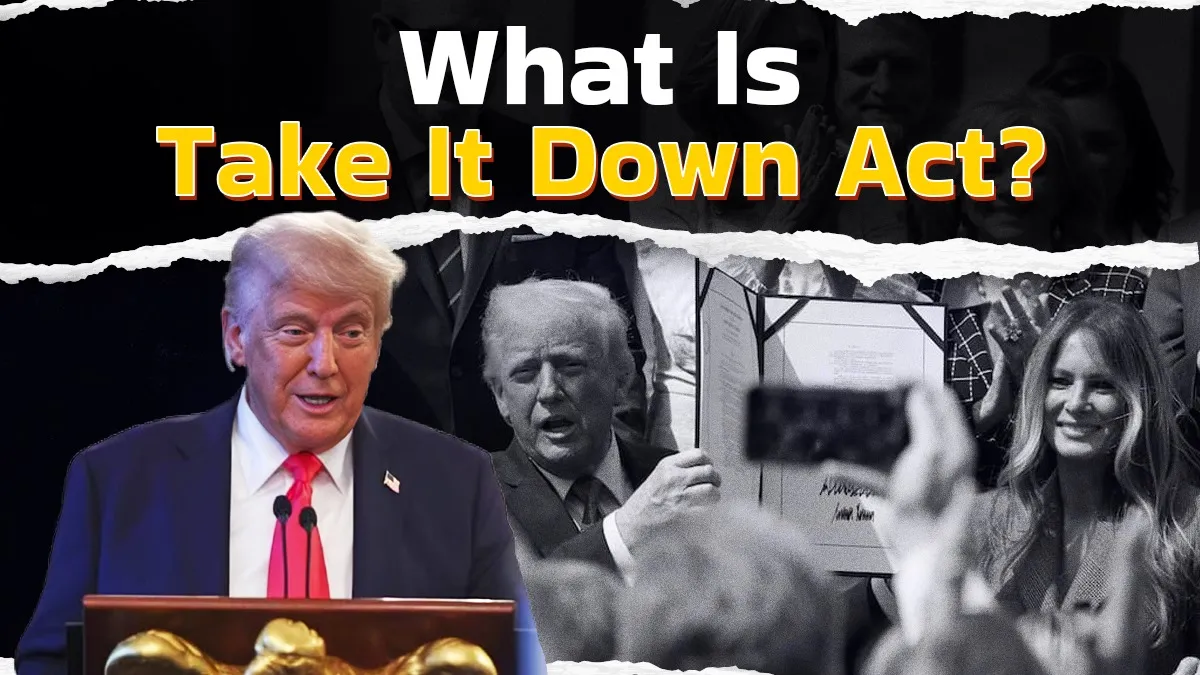- By Akansha Pandey
- Wed, 21 May 2025 11:56 AM (IST)
- Source:JND
US President Donald Trump has officially signed the landmark ‘Take It Down Act’, a crucial federal law designed to combat ‘revenge porn’. This bipartisan legislation, championed by First Lady Melania Trump, now criminalises the non-consensual publication of intimate images, specifically including AI-generated "deepfakes".
The bill achieved significant congressional support, passing the Senate by unanimous consent in February and the House with an overwhelming 409-2 vote in April. Melania Trump's active lobbying efforts were pivotal in ushering the bill through Congress. Although her symbolic signing of the Act on Monday holds no formal legislative power, it powerfully underscores her commitment to this vital online safety initiative. This new federal mandate is poised to significantly impact digital platforms and social media companies by ensuring prompt content removal.
“Today, through the ‘TAKE IT DOWN’ Act, we affirm that the well-being of our children is central to the future of our families and America. I am proud to say that the values of BE BEST will be reflected in the law of the land.” - FLOTUS pic.twitter.com/c9PujU5MGZ
— First Lady Melania Trump (@FLOTUS) May 19, 2025
“This will be the first-ever federal law to combat the distribution of explicit imagery posted without subjects' consent," Trump said during the signing ceremony at the White House. "We will not tolerate online sexual exploitation," he added.
Melania called the new legislation a "national victory", saying, "AI and social media are the digital candy for the next generation, sweet, addictive and engineered to have an impact on the cognitive development of our children. But unlike sugar, these new technologies can be weaponised, shape beliefs and, sadly, affect emotions and even be deadly."

A momentous signing: President Trump enacts the Take It Down Act on May 20, in a landmark legislation championed by First Lady Melania Trump. (Image: X, The White House)
What is the Take It Down Act?
The ‘Take It Down Act’ federally criminalises the "knowing publication" or threatened publication of intimate images without a person's consent, explicitly encompassing AI-created "deepfakes". A key provision of the act mandates that websites and social media entities remove such material within 48 hours of receiving notification from a victim, in addition to undertaking measures to eliminate duplicate content. This represents a notable instance of federal regulatory oversight imposed upon internet companies, in contrast to the prior prevalence of state-level prohibitions on sexually explicit deepfakes or revenge porn.
Who supports the Take It Down Act?
The Take It Down Act, which received robust bipartisan support, was strongly advocated by Melania Trump. She lobbied on Capitol Hill in March, expressing that it was "heartbreaking" to witness the victimisation of teenagers, particularly girls, by the spread of such content.
This legislation was inspired by the ordeal of Elliston Berry, whose mother sought help after Snapchat took nearly a year to remove an AI-generated "deepfake" of her then 14-year-old daughter. Notably, Meta, the parent company of Facebook and Instagram, has publicly endorsed the new law.
WhyTake It Down Act Is Crucial
The new law is crucial because the rapid spread of non-consensual deepfakes, fueled by easily accessible AI tools like photo apps that "undress" images, poses a significant threat that current regulations can't keep up with. While public figures like Taylor Swift and Alexandria Ocasio-Cortez have been victims of deepfake pornography, experts emphasize that ordinary women are just as susceptible. A wave of AI porn scandals have been reported at schools across US states with hundreds of teenagers targeted by their own classmates. Such non-consensual imagery can lead to harassment, bullying or blackmail, sometimes causing devastating mental health consequences, experts warn.
Under this new law, social media platforms and websites are mandated to take down explicit images and videos, including those created with AI, within 48 hours of a victim's request. Individuals who intentionally share these images without consent could face prison time.
Censorship Concern On Take It Down Act
Free speech advocates and digital rights groups say the bill is too broad and could lead to the censorship of legitimate images including legal pornography and LGBTQ content, as well as government critics.The Electronic Frontier Foundation (EFF) states that while the bill aims to solve a serious problem, its "takedown provision" applies to a much wider range of content than intended and lacks safeguards against false requests. The EFF warns that the mandated 48-hour removal timeframe will force services to rely on automated filters, which often wrongly flag legal content. This pressure could lead companies, especially smaller ones, to remove content without verifying its illegality to avoid legal risk. Furthermore, the EFF claims the measure pressures platforms to monitor encrypted speech to address liability threats.
